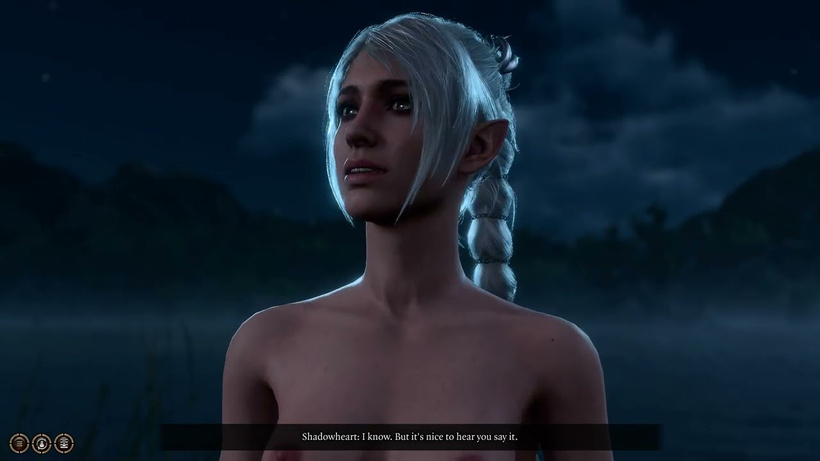Dev Diary 3: Mechanics and the Meaning of Choice
11 minutes ago
Hello everyone, and welcome to the third
Black Incense development diary. If you haven’t had a chance to try it yet, the free Prologue is available
You must be registered to see the links
.
The past week has been split between writing and art, drafting dialogue, refining images, and shaping Molly’s first real encounter with the hidden world beneath her feet. Apart from the brief flash-forward in the Prologue, this is where her descent truly begins, and it’s been a lot of fun designing scenes that give just the faintest glimpse of what’s waiting for her.
“So, you’re probably wondering how I got myself into this situation…”
As promised in last week’s diary, this entry looks at the core mechanics you
won’t see in
Black Incense. Knowing what to leave out is just as important as deciding what to include; it defines a project’s identity just as sharply.
And as I began writing the dev diary, this naturally evolved into a broader reflection on player choice and agency, which makes sense, since that’s at the heart of the experience I’m building.
A quick note before diving in: none of this is meant as an objective criticism of other games. Design is always about intent and perspective. What works brilliantly in one project can feel out of place in another. My aim isn’t to claim authority over what’s “good” or “bad”, only to be transparent about the principles guiding
Black Incense and why they matter to me.
So, with that said, let’s talk about the mechanics I’m deliberately steering clear of, and why.
False Freedom: When the Game Says No
There’s a design habit I’ve seen in several adult games, even some otherwise excellent ones, that never fails to frustrate me. You reach a moment you’ve been anticipating: the character you’ve been wanting to sleep with all game finally makes a move. They flirt, they invite you in, and then… you discover that the “accept” option is greyed out.
Maybe you haven’t accumulated enough lust points. Maybe your relationship stat with them isn’t high enough. Maybe you’ve slept with someone else earlier, and the developer decided that disqualifies you from this encounter. Whatever the reason, the moment collapses.
To me, this completely breaks immersion. Someone in the story has made an offer, and the fundamental choice before you is simple: yes or no. Real people, when faced with that moment, can always choose either, regardless of past choices. They might face consequences, but they can still decide. Removing that choice undermines the illusion that you’re steering the character’s life. In a narrative game, that illusion is everything.
This doesn’t mean I dislike systems that track relationships or past behaviour. Quite the opposite: those systems are essential. Previous choices should absolutely shape the story and influence what’s available to you. But there’s an important distinction here.
When the game presents a choice, you should always be free to take it.
If I want a sex scene to only unlock only when you have a good relationship with a character, there are better, more natural ways to handle it. Perhaps the character only makes that invitation if your relationship is strong enough and the offer never appears if you haven’t earned it. Or perhaps you can choose to make the proposition yourself, and their response depends on your standing with them. Both mirror how things might unfold in real life.
What I’ll never do is dangle a choice in front of you and then tell you you’re not allowed to make it because some invisible number isn’t high enough.
When I talk about player agency, this is where it begins: every option that appears on the screen should be one the player can genuinely take. The consequences might differ, but the choice itself should never be denied. Once a possibility exists in the fiction, it should belong to the player to accept or reject. That’s how immersion stays intact, and how choice stays meaningful.
The Right to Try (and Fail)
The second part of this philosophy is about freedom of attempt. A lot of games use skill checks or stat gates that only offer you a choice if you’ve already reached a high enough level to succeed. In
Black Incense, I’m taking a different approach.
If there’s a wall to climb, a door to pick, or a lie to tell, you can always try it, whatever your current skill level. You might fail (and failure will have its own consequences) but the decision to attempt it is always yours.
That matters, because failure is part of storytelling. It reveals character, creates tension, and opens branches you wouldn’t otherwise see. I love how
Disco Elysium handles this, where sometimes failing at a skill check can lead to more interesting options than succeeding.
There will, of course, be rare exceptions where a choice simply wouldn’t make sense. If your cyber skill is near zero, your character won’t see an option to install spyware because they wouldn’t know what spyware is. But those moments will be logical, not arbitrary.
And when you do fail at something, it will never be game over. It will just be a further development in your story, wherever that may take you.
To me, agency means more than just success. It’s the freedom to decide what you’re willing to risk, to choose boldly, to fail spectacularly, and to live with the outcomes. That’s what gives narrative choices real weight, and what keeps a story alive with possibility.
Winning is Fun, Actually
I’m borrowing this subtitle from
RimWorld's tagline - Losing is Fun. Whilst
RimWorld is one of my favourite games of all time and does what it sets out to do excellently, a lot of other modern games seem almost eager to trip players up in less fun ways, turning progress into a series of traps rather than challenges. Difficulty isn’t the issue; arbitrariness is.
I’ll single out one example, because it perfectly illustrates what I mean. I tried
Suzerain recently, and on paper it should have been my ideal game, a political role-playing experience full of moral choices and branching outcomes. But the design drove me mad. It’s almost impossible to reach the outcome you want without consulting a wiki to dodge hidden pitfalls. The most ridiculous example I found was that if you want to succeed as a hardline dictator, you have to order the salad in one particular lunch scene. Pick anything else and several hours of gameplay further down the line the person you dined with refuses to back your coup and you will lose no matter what. That kind of invisible fail condition doesn’t challenge the player, it just breaks internal logic.
There’s clearly an audience for that sort of punishing design, and I’m not saying it’s objectively wrong. It just runs counter to how I want
Black Incense to feel. When someone gives hours of their time to explore a world I’ve built, I don’t want to frustrate them. I want to help them tell the version of the story they’ve imagined. My job as a developer isn’t to block the player, it’s to facilitate their story.
That doesn’t mean choices won’t have weight. They will, and sometimes consequences will unfold in ways the player couldn’t predict. In the Prologue, for example, choosing to spend Molly’s gap year in the Alps opens the opportunity for her first lesbian experience, while choosing Thailand leads to the possibility of a threesome. I don’t tell the player this in advance, because discovery is part of the fun, and part of how the world feels alive.
They do say taking a gap year is about having new experiences...
But as much as possible, I want to avoid locking players out of major storylines, factions, or relationships through hidden triggers or arbitrary design decisions. There will be no hidden "salad or death" choices in
Black Incense.
The player isn’t here to be second-guessed; they’re here to realise a vision. If someone wants to play Molly as a saint, a schemer, or a fallen angel, my job is to make sure the game responds to that choice, not punish them for daring to make it. The story should feel like a collaboration between writer and player, not a contest.
That’s the philosophy.
Black Incense isn’t about catching you out with hidden failures or punishing you for not reading the developer’s mind. It’s about giving you the tools to shape a living narrative and see the consequences unfold. Choices should open doors, not slam them shut.
No Paths Set in Stone
This connects closely to the last point, but it’s worth addressing on its own. One thing I want to avoid completely in
Black Incense is forced railroading, especially the kind that comes from stat systems.
A few of you have asked how skills and traits will work, and I’ll go into full detail on that in next week’s dev diary. For now, though, I want to make one promise clear: your build will shape your story, not restrict it. Choosing to focus on intelligence over empathy, or intuition over willpower, won’t close off entire paths or relationships. It will just change how you experience them.
Skills and traits will determine what you notice, how you solve problems, and how other characters respond to you. They’ll open up new ways to approach scenes, uncover secrets, and navigate the world. But they’ll never lock you out of factions, romances, or moral alignments. The story is bigger than a stat sheet.
Think of it like the classes in
Baldur’s Gate 3. Playing a Barbarian or a Wizard feels very different, but both can still choose to be good or evil, shape the world around them, and romance whichever companion you want.
Let's face it though, you're going to be romancing Shadowheart. Again.
The same is true here. Your version of Molly might be charming or analytical, impulsive or calculating, but every path remains open, and every story remains yours to tell.
Focus, Not Filler
One final point about focus. You won’t find arbitrary mini-games in
Black Incense. I’ve played a lot of adult games that try to break up the story with puzzles, reflex tests, or small side mechanics, and it usually does not work. It interrupts the atmosphere and pulls attention away from what makes this kind of game distinctive in the first place.
Eroticism, at its core, is a blend of sensation and narrative. Pornography provides the former, literature the latter, but only an interactive story can let you shape that narrative yourself. That’s where this medium becomes so powerful. When done properly, the act of choosing, influencing, and directing the story is the erotic experience. Adding a platformer or arcade mini-game into that space breaks the illusion completely.
That doesn’t mean
Black Incense will be confined to static dialogue choices forever. There are ways to expand narrative interactivity that still serve the story rather than distract from it. As Molly becomes more deeply enmeshed in the hidden world of cults, conspiracies, and vice, her role in it may evolve. In time, she could find herself not only surviving that world but shaping it, directing parts of its machinery, managing influence, or commanding power of her own. Those systems, when they arrive (not until Season 2 or 3 most probably), will exist to reflect that narrative growth, not to pull focus from it.
Looking Ahead
This one ran a little longer than planned, so I’ll wrap it up here and get back to writing the next release. As I mentioned earlier, next week’s dev diary will take a closer look at the trait and skill system in
Black Incense, how it shapes the story, and how your choices influence the kind of person Molly becomes.
In the meantime, if you’ve been enjoying these updates and want to see the game grow faster, deeper, and better with each release, consider
You must be registered to see the links
on Patreon. Every bit of backing directly fuels development, more writing time, better tools, more art, more story. It’s what makes this whole project possible.
Thanks again for reading and for all the encouragement so far. Have a great week, and I’ll see you in the next diary.
Himeros





